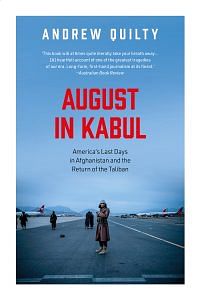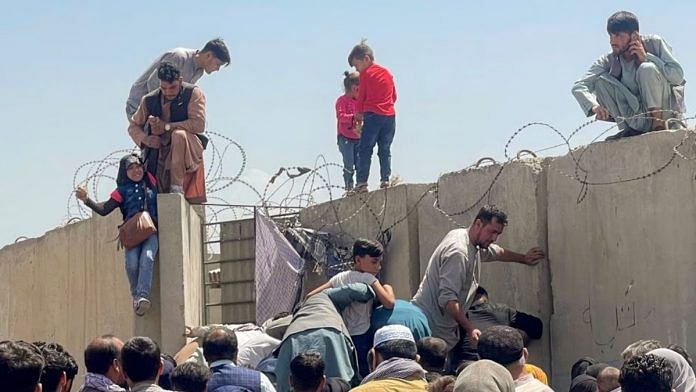Bahar was looking at her phone when she sensed someone crouching beside her. The young woman introduced herself as Najma Sediqi, and asked whether she and her 21-year-old brother Wasiq and her 27-year-old cousin Shahid could join Bahar’s family by the wall.
Bahar was captivated by Najma, who was two years older than she was, with dark features made more pronounced by skin as smooth as porcelain. Bahar didn’t recognise her, but Najma said she worked as a television presenter. She was bold and confident. When her brother made room for a woman to sit by the wall, and the woman’s husband abused him for what he assumed was an attempt to get close to his wife, Najma stood up and lambasted the man for jumping to conclusions. ‘We sat side by side on our backpacks,’ says Bahar. ‘For 12 hours, Najma told me about her school, her achievements, and later on how she got a job in TV and about the trouble she received from the public, especially men.’
Najma had thought she had a strong case for being accepted by a foreign country because of her work. ‘Once I’m inside the airport, I can manage everything,’ she’d said at first. But when she saw the folder of documents that Bahar and her family had compiled to support their own evacuation efforts and asylum claims, Najma was taken aback. She hadn’t understood how narrow was the criteria for being allowed inside the airport, and now she was worried that the YouTube videos she planned to present—some of which had been viewed hundreds of thousands of times—weren’t going to satisfy the soldiers who would decide the fate of her and her family.
Also read:
The two families bought bolani (deep-fried flatbread filled with shredded leek and potato) and bottles of water from young boys who wandered through the crowds until there was no space left to walk, much less ply their trade. The sun, meanwhile, moved over the airport, turning the service road along the canal into a furnace.
To have any chance of entering the airport, Bahar and Najma and their families would have to wade through the knee-deep sewage, which the soldiers on the opposite bank were using as a buffer to contain the crowds, and present their cases. While the criteria changed from hour to hour, the foreign forces were looking almost exclusively for foreign passport or visa holders.
Few, if any, Afghans who didn’t hold the priceless documents were taken inside the airport on the basis of unverified threats, regardless of how serious—or genuine—they were. Yet still they came with certificates from training courses undertaken with foreign organisations and militaries in the early 2000s, photographs with foreign dignitaries and military officers, employment contracts with embassies and international contracting organisations, letters of support from foreign officials, copies of family members’ foreign passports and driver’s licences, visa-application acknowledgment letters, Taliban threat letters and photos of slain family members. Some even came with electricity bills or vehicle registration documents.
The longer the two families waited for space to open up in the canal, the more people surged into the service road until, by midafternoon, there was no room to sit. Like a volcano that creates its own weather patterns, the crowd started producing forces of its own and the two families jostled and swayed just to keep their feet.
When Bahar’s younger siblings became so exhausted they could no longer stand, the adults encircled them in a protective ring while the children sat for a few minutes at a time to rest.
The hope that the dark would bring some respite from the rush at Abbey Gate faded as midnight came and went. There seemed little hope of even entering the canal, let alone the airport. The two families started talking about retreating from the heaving morass.
Najma’s group wanted to try another gate, while Bahar’s family simply wanted to go home. Najma and Bahar exchanged WhatsApp numbers, as did Nizam and Shahid. ‘Najma and the others left at 2 a.m.,’ says Nizam, ‘but because I had the whole family with me it was impossible. It became so crowded we couldn’t leave.’ The risk of losing one of his young children in the crowd, or worse, as they tried to get out, was too great. They stayed through the night, until 8 a.m., when Nizam felt it was safe to move back towards the main airport entrance. After carrying nine-year-old Muzamel in his arms for 45 minutes before finding a taxi, Nizam swore to himself that he wouldn’t bring his children back to the airport.
When Bahar arrived home, she contacted Najma to see whether they had succeeded elsewhere. ‘We failed,’ Najma said. ‘I feel sick and my feet are sore. I will never go to the airport again.’
 This excerpt from Andrew Quilty’s ‘August in Kabul: America’s Last Days in Afghanistan and the Return of the Taliban’, has been published with permission from Speaking Tiger books.
This excerpt from Andrew Quilty’s ‘August in Kabul: America’s Last Days in Afghanistan and the Return of the Taliban’, has been published with permission from Speaking Tiger books.



